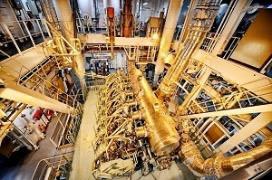45
BIOFUELS
The marine fuel market is rapidly evolving. Low and zero carbon fuels have been readily distinguished as key to fulfilling impending global decarbonisation targets, resulting in a huge increase in the production and development of “future fuels”, as Teemu Jutila of Auramarine explains
FACING THE FUTURE
Teemu Jutila Director of Engineering and Products, Auramarine
Questions about the supporting infrastructure, quality and cost of so-called future fuels — as well as the pressure of day-to-day operations — is halting industry uptake, with uncertainty leading to some shipowners stalling newbuild orders. Building shipowner and operator confidence in newer fuels is becoming increasingly important and relies on critical factors, such as financial viability, fuel supply infrastructure as well as availability. One such existing clean fuel that continues to make quick progress is biofuel. In fact, several leading maritime organisations, such as The Finnish Maritime Industry, have stated that biofuels “could use the existing bunkering infrastructure with minor modifications and therefore show a strong potential to replace part of the fuel mix”. Likewise, moves from major industry influencers —such as Trafigura, which recently started trialling biofuels across its fleet — indicate that it is set to have an increasing market share.
C L E A N S H I P P I N G INTERNATIONAL – Autumn 2021
At Auramarine, we view biofuels as one of the most feasible and effective low-carbon future fuel options. Our 45 years of expertise, designing and manufacturing fuel supply systems for a wide range of fuels, has led us to conclude that the fuel, when sustainably produced, will play a key role in ensuring the future decarbonisation of the shipping industry.
INSPIRING CONFIDENCE
The continuation of research, widespread industry collaboration and a meticulous approach is required if we are to fully realise biofuels. The uptake of biofuels — as with any future fuel — relies on a high attention to detail and scrutiny of infrastructure and operations across the entire supply chain. With this in mind, and to further support shipowners and operators in the transition, we are working with industry leaders on the three-year collaborative BioFlex project to determine the most ecologically and economically sustainable way to evolve

















